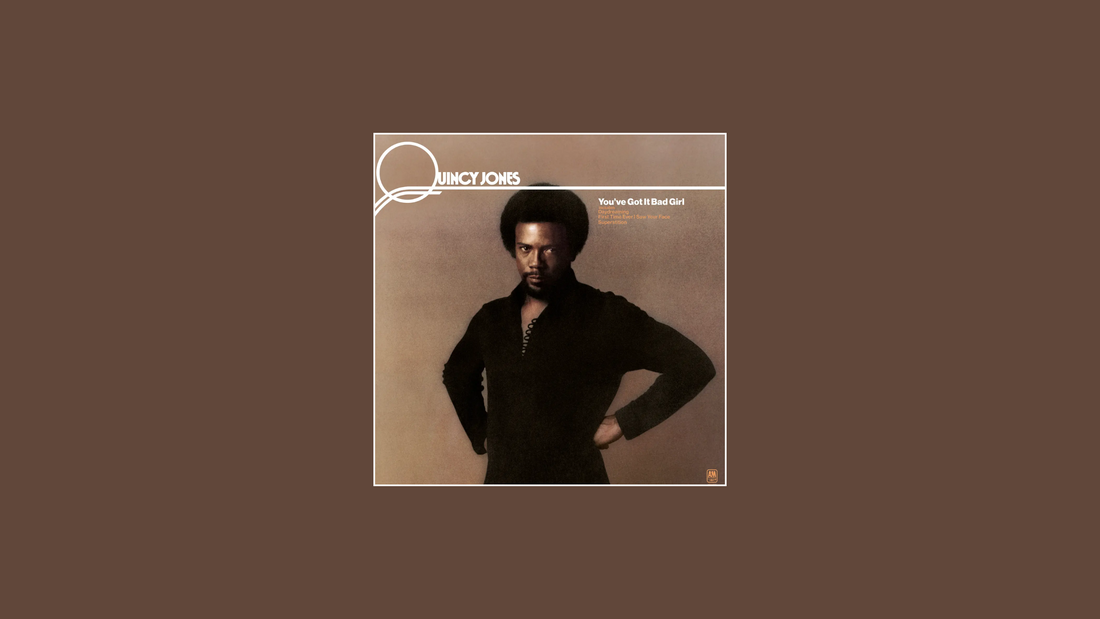
Quincy Jones – You’ve Got It Bad Girl (1973)
By Rafi Mercer
Some records arrive dressed for the times. Others arrive dressed for the future. You’ve Got It Bad Girl, Quincy Jones’s 1973 outing, does both. The cover — vibrant, modernist, with its title borrowed from a Stevie Wonder track — promised something sleek, contemporary, even playful. Yet the music inside went deeper, building a bridge between soul, funk, orchestral jazz, and the studio-as-instrument experiments that would shape the decades to come. Listening now, fifty years later, you realise how effortlessly Quincy pulled it off.
By 1973, Jones was already a legend. He’d arranged for Sinatra, scored films, produced pop, and moved with ease between the orchestra pit and the control booth. But You’ve Got It Bad Girl captures him in a particularly fertile moment, when he was not just arranging but sculpting sound, pulling from the electric palette of fusion, the groove of Motown, and the rising possibilities of studio technology. What makes the record endure is its clarity: nothing here feels cluttered. Every horn line, every string phrase, every wah-wah guitar lick arrives exactly where it should.
The title track, a Stevie Wonder composition, is perhaps the most obvious entry point. Wonder’s version, from Talking Book (1972), was intimate and personal, all breath and tremor. Jones reimagines it widescreen, layering lush orchestration without diluting its melancholy core. It becomes less a confession than a shared mood, a song designed to fill a room. In a listening bar, the effect is immediate: conversation drops a notch, heads lean back, and the air itself feels tuned.
Elsewhere, the album reveals Jones’s genius for repertoire. “Summer in the City,” originally a Lovin’ Spoonful hit, becomes unrecognisable — reworked into a slow, funk-drenched instrumental that would later become one of the most sampled tracks in hip hop. The breakbeat, handled with quiet authority by Bernard Purdie, has appeared under artists from the Pharcyde to Nas, yet nothing matches the cool patience of the original. The track doesn’t hurry. It leans into its groove like a long exhale, strings sweeping in like sunlight through blinds.
“Superstition,” another Stevie Wonder staple, gets a makeover too. Quincy resists the temptation to imitate the original’s raw clavinet riff. Instead, he rebuilds the song as a jazz-funk landscape, brass hitting like punctuation, rhythm section steady but never overbearing. It’s less about the grit of funk and more about its architecture. This version knows how to dress.
But the surprises run deeper than the covers. “Chump Change,” written with Bill Cosby for a television theme, is both playful and razor sharp, proof that Jones could turn even a small commission into a groove machine. “Manteca,” Dizzy Gillespie’s Afro-Cuban classic, gets a new coat, all rhythmic colour and brassy swagger. And then there’s “Sanford and Son Theme (The Streetbeater),” which manages to sound like both a street parade and a meticulous studio construct — no small feat.
What’s remarkable about You’ve Got It Bad Girl is its coherence. On paper it could have been a jumble — covers, TV themes, jazz standards — but Jones’s arranging and producing sensibilities hold it all together. The horns are bold but never brash, the strings sweep without drowning, the rhythm section always leaves air. He makes the eclectic feel inevitable.
On vinyl, the record breathes in ways digital reissues sometimes miss. The bassline on “Summer in the City” has a rounded warmth, the strings shimmer with grain, and the percussion carries tiny air pockets between each hit. On a finely tuned system, the album reveals its true character: funky but never frenetic, lush but never overripe. It is, in essence, balance captured on tape.
In the context of the Tracks & Tales listening shelf, this record serves a very specific role. It is an early-evening album, the kind you play when the room is filling but not yet loud, when you want groove without insistence, polish without pretension. It works in bars where conversation matters as much as music, yet it rewards those who stop to listen closely. You can hear echoes of jazz-funk pioneers, the foresight of hip hop sampling culture, the elegance of orchestral arranging. Few records are this generous.
For Jones himself, You’ve Got It Bad Girl was another chapter in a career of chapters. He would go on to produce Off the Wall and Thriller, to reshape popular music at the highest level. But here, you hear him in dialogue with his own roots and with the sound of a changing world. It’s the work of a man both utterly at ease and restlessly inventive.
Play it at home, and you may find your living room sounding larger than it is. Play it in a listening bar, and you’ll see how easily it resets the atmosphere. That’s Quincy Jones’s gift: not just to write or arrange, but to recalibrate space itself.
Rafi Mercer writes about the spaces where music matters. For more stories from Tracks & Tales, subscribe, or click here to read more.







